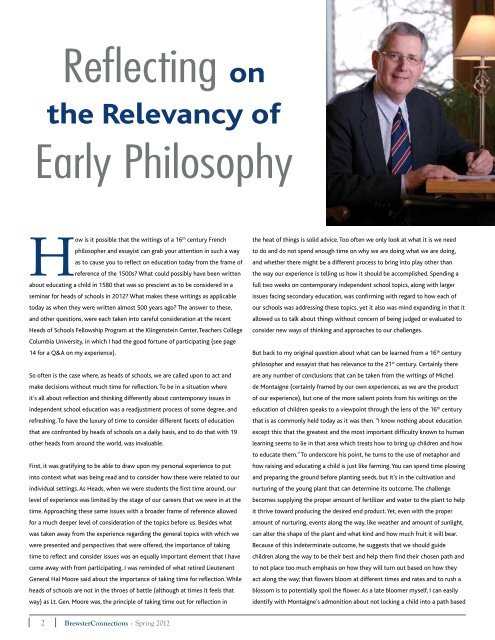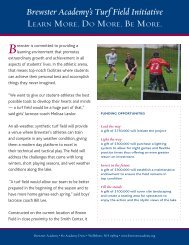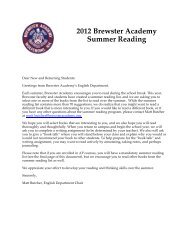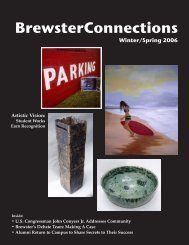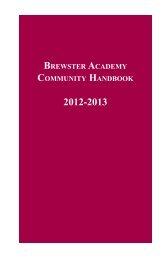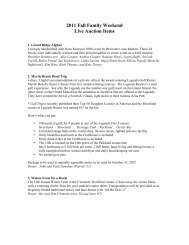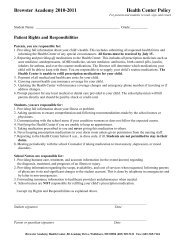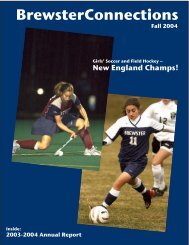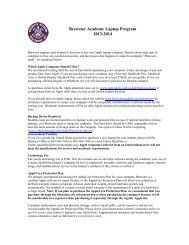BrewsterConnections(PDF) - Brewster Academy
BrewsterConnections(PDF) - Brewster Academy
BrewsterConnections(PDF) - Brewster Academy
You also want an ePaper? Increase the reach of your titles
YUMPU automatically turns print PDFs into web optimized ePapers that Google loves.
Reflecting on<br />
the Relevancy of<br />
Early Philosophy<br />
How is it possible that the writings of a 16 th century French<br />
philosopher and essayist can grab your attention in such a way<br />
as to cause you to reflect on education today from the frame of<br />
reference of the 1500s? What could possibly have been written<br />
about educating a child in 1580 that was so prescient as to be considered in a<br />
seminar for heads of schools in 2012? What makes these writings as applicable<br />
today as when they were written almost 500 years ago? The answer to these,<br />
and other questions, were each taken into careful consideration at the recent<br />
Heads of Schools Fellowship Program at the Klingenstein Center, Teachers College<br />
Columbia University, in which I had the good fortune of participating (see page<br />
14 for a Q&A on my experience).<br />
So often is the case where, as heads of schools, we are called upon to act and<br />
make decisions without much time for reflection. To be in a situation where<br />
it’s all about reflection and thinking differently about contemporary issues in<br />
independent school education was a readjustment process of some degree, and<br />
refreshing. To have the luxury of time to consider different facets of education<br />
that are confronted by heads of schools on a daily basis, and to do that with 19<br />
other heads from around the world, was invaluable.<br />
First, it was gratifying to be able to draw upon my personal experience to put<br />
into context what was being read and to consider how these were related to our<br />
individual settings. As Heads, when we were students the first time around, our<br />
level of experience was limited by the stage of our careers that we were in at the<br />
time. Approaching these same issues with a broader frame of reference allowed<br />
for a much deeper level of consideration of the topics before us. Besides what<br />
was taken away from the experience regarding the general topics with which we<br />
were presented and perspectives that were offered, the importance of taking<br />
time to reflect and consider issues was an equally important element that I have<br />
come away with from participating. I was reminded of what retired Lieutenant<br />
General Hal Moore said about the importance of taking time for reflection. While<br />
heads of schools are not in the throes of battle (although at times it feels that<br />
way) as Lt. Gen. Moore was, the principle of taking time out for reflection in<br />
the heat of things is solid advice. Too often we only look at what it is we need<br />
to do and do not spend enough time on why we are doing what we are doing,<br />
and whether there might be a different process to bring into play other than<br />
the way our experience is telling us how it should be accomplished. Spending a<br />
full two weeks on contemporary independent school topics, along with larger<br />
issues facing secondary education, was confirming with regard to how each of<br />
our schools was addressing these topics, yet it also was mind expanding in that it<br />
allowed us to talk about things without concern of being judged or evaluated to<br />
consider new ways of thinking and approaches to our challenges.<br />
But back to my original question about what can be learned from a 16 th century<br />
philosopher and essayist that has relevance to the 21 st century. Certainly there<br />
are any number of conclusions that can be taken from the writings of Michel<br />
de Montaigne (certainly framed by our own experiences, as we are the product<br />
of our experience), but one of the more salient points from his writings on the<br />
education of children speaks to a viewpoint through the lens of the 16 th century<br />
that is as commonly held today as it was then. “I know nothing about education<br />
except this: that the greatest and the most important difficulty known to human<br />
learning seems to lie in that area which treats how to bring up children and how<br />
to educate them.” To underscore his point, he turns to the use of metaphor and<br />
how raising and educating a child is just like farming. You can spend time plowing<br />
and preparing the ground before planting seeds, but it’s in the cultivation and<br />
nurturing of the young plant that can determine its outcome. The challenge<br />
becomes supplying the proper amount of fertilizer and water to the plant to help<br />
it thrive toward producing the desired end product. Yet, even with the proper<br />
amount of nurturing, events along the way, like weather and amount of sunlight,<br />
can alter the shape of the plant and what kind and how much fruit it will bear.<br />
Because of this indeterminate outcome, he suggests that we should guide<br />
children along the way to be their best and help them find their chosen path and<br />
to not place too much emphasis on how they will turn out based on how they<br />
act along the way; that flowers bloom at different times and rates and to rush a<br />
blossom is to potentially spoil the flower. As a late bloomer myself, I can easily<br />
identify with Montaigne’s admonition about not locking a child into a path based<br />
2 <strong><strong>Brewster</strong>Connections</strong> – Spring 2012


